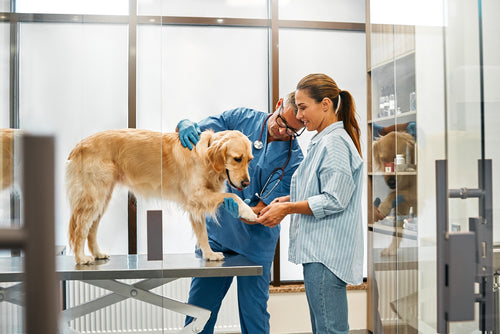As a dog owner, you can appreciate that endearing, perfectly normal head tilt when your pup perks up at the mention of going for a W-A-L-K. If he’s consistently tilting and shaking his head, though, that could be a sign of something a bit less fun than an afternoon stroll: an ear issue!
Ear issues are a much more common occurrence in canines than humans. This is because Fido’s ear canal is shaped differently than yours; it’s more vertical and L-shaped, so it holds in more fluid. In fact, 20 percent of dogs are likely to have some form of ear issue—especially if they have long, floppy ears with less airflow and a greater chance of trapping debris (here’s looking at you, Basset Hounds and Cocker Spaniels).
Types of ear issues
Bacteria and yeast, both of which are normal and natural, can sometimes get out of balance; an overgrowth of bacteria or yeast can lead to infected ears with a bad smell and brown, yellow or greenish discharge.
Foreign bodies such as dirt, bugs, water, or debris in general can also get trapped in the ear. If not removed, this could lead to ear issues, often from bacteria or yeast overgrowth. Trying to remove a foreign body yourself can push the object down further and cause further damage, though, so call your vet if your furry friend is feeling agitated by something that just won’t leave his ear despite his efforts.
Aural hematoma is caused by trauma to the ear such as scratching or shaking too hard, or even a bite wound. If Fido is too aggressive in his efforts to dislodge a foreign body trapped in his ear, he could burst a blood vessel between the skin and ear cartilage.
Ear mites are common in puppies. They’re highly contagious, and can usually be identified by discharge that looks like coffee grounds in the ear. An ear mite outbreak should be treated as soon as possible.

Causes
Some factors at play in these types of ear issues include:
- An excess of moisture in the ear… also known as prime breeding grounds for bacteria and yeast.
- The wrong diet for your doggo. Some type of dog food feed the body’s natural yeast, causing it to grow and lead to inflammation.
- A weak immune system and/or seasonal allergies.
- Too much cleaning (yes, there is such a thing). Over cleaning can lead to inflamed, irritated skin.
- Wax buildup. However, keep in mind that a little wax is perfectly normal, and doesn’t need to be cleaned.
Symptoms
Many ear issues show up as shaking/tilting the head; scratching at the ear; discharge; unpleasant odors; redness and swelling; itchiness; crustiness and scabs. In extreme cases, ear issues could lead to a loss of hearing and balance.
If your furry best friend’s behavior seems odd or he’s showing signs of discomfort, that’s a likely indicator that he may need some extra care.
Care
As a general rule of thumb, it’s best to consult the vet before trying to diagnose and treat your dog’s ear issue at home. However, there are some ear issues that can be addressed naturally at home.
Depending on the type of ear issue, many vets will prescribe a medicated ear cleaner or topical medication. They may also provide antibiotics and anti-inflammatory medications, which should be taken in accordance with the vet’s directions.
With appropriate treatment, many ear issues will clear up within a few weeks.
Care Tips
Some good care practices include:
- Drying your furry friend’s ears after bath time or a swim to remove excess moisture which could attract bacteria and yeast.
- Boosting your pup’s immune system through a balanced diet, hydration, exercise, and nutritional supplements.
- Identifying any underlying issues such as skin or food allergies, or other health issues that could be contributing to ear issues
- Clean the ear regularly—but remember to avoid over cleaning. Pet Honesty’s OTIC Ear Cleaner and Drier is perfect for cleaning your dog’s ears gently and safely, flushing out that gunk that leads to odors and irritation. It can also help with removing wax build up.
In an ideal world, our pups would never have to deal with the pain and discomfort that comes with canine ear issues. If an ear infection is detected, early treatment is the next best choice.
Sources:
https://www.akc.org/expert-advice/health/dog-ear-infections/
https://www.dogsnaturallymagazine.com/5-home-remedies-for-dog-ear-infections/
https://vcahospitals.com/know-your-pet/ear-infections-in-dogs-otitis-externa






